Turkey is unlikely to shut down key US military bases on its territory despite escalating rhetoric that it will take such retaliatory steps in response to possible US sanctions, two experts in the field of international relations told Sputnik
MOSCOW (Pakistan Point News / Sputnik - 14th December, 2019) Turkey is unlikely to shut down key US military bases on its territory despite escalating rhetoric that it will take such retaliatory steps in response to possible US sanctions, two experts in the field of international relations told Sputnik.Turkish Foreign Minister Mevlut Cavusoglu, in an interview aired on December 11 on the A Haber television station, warned that Turkey could seek to shut down the Incirclik airbase and the Kurecik radar station if the US were to move forward with imposing sanctions against Turkey.
The threat of sanctions was the latest in a series of antagonizing moves between the two NATO allies. Turkey's purchase of Russian S-400 air defense systems has been the main point of contention for the US, but Turkey's operation in northern Syria and its willingness to veto a NATO Baltic defense plan in order to force the alliance to recognize the Kurdish Workers' Party (PKK) as terrorists have also put distance between Washington and Ankara.
Huseyin Bagci, a professor of international relations at middle East Technical University in Ankara, told Sputnik that the US must learn to accept Turkey's purchase of Russian military hardware, as the alternative may prove unfavorable to both sides.
"I think that the US will not impose sanctions practically but it is still a very dangerous development for both countries. For the Turkish side, the S-400 issue is closed and I think they have crossed a point of no return. It means that the US has to accept the fact. Therefore, the sanctions will harm Turkey but there will be no step back as far as I can evaluate," Bagci said to Sputnik.
Birol Baskan, a scholar at the Washington-based Middle East Institute think tank, called into question the gravity of Cavusoglu's statement regarding the US military presence in the country.
"Turkey's reaction will, by and large, be symbolic, I believe. I do not think that the closure of Incirlik is on the table, or any other major retaliation for that matter," Baskan said.
Bagci seconded his compatriot's view, saying that ordering the closure of Incirlik or Kurecik is no easy decision for Ankara to make, even if sanctions are imposed.
Despite the geopolitical differences between the two countries, the relationship is remedied by the strong chemistry between US President Donald Trump and his Turkish counterpart, Recep Tayyip Erdogan.
"The bilateral relations between the US and Turkey are at their historic lows for sure. But, I do not see a total collapse is coming. Presidents Erdogan and Trump have very good relations. Even though the strength of this relationship saved Turkey-US relations from deteriorating further. Still, the US and Turkey cannot afford to lose each other," Baskan said.
Bagci expressed the same opinion by saying that the two countries are experiencing "institutional coldness but presidential warmth."
In mid-October, shortly after Turkey launched its operation against the Kurdish forces in northern Syria, The New York Times reported that US State and Energy departments were discussing ways of withdrawing the roughly 50 nuclear warheads in Incirlik. The military airbase has been enhanced with nuclear weapons since the height of the Cold War in the 1970s.
The newspaper cited a senior official as saying that the withdrawal would mean the de facto end of the US-Turkish alliance.
The US Congress has been the driving force behind Washington's moves against Ankara much to Trump's displeasure, according to Baskan. Most recently, both chambers of congress, the House and the Senate, voted to officially recognize the Armenian genocide in the early 20th century as carried out by Turkey's predecessor, the Ottoman Empire.




